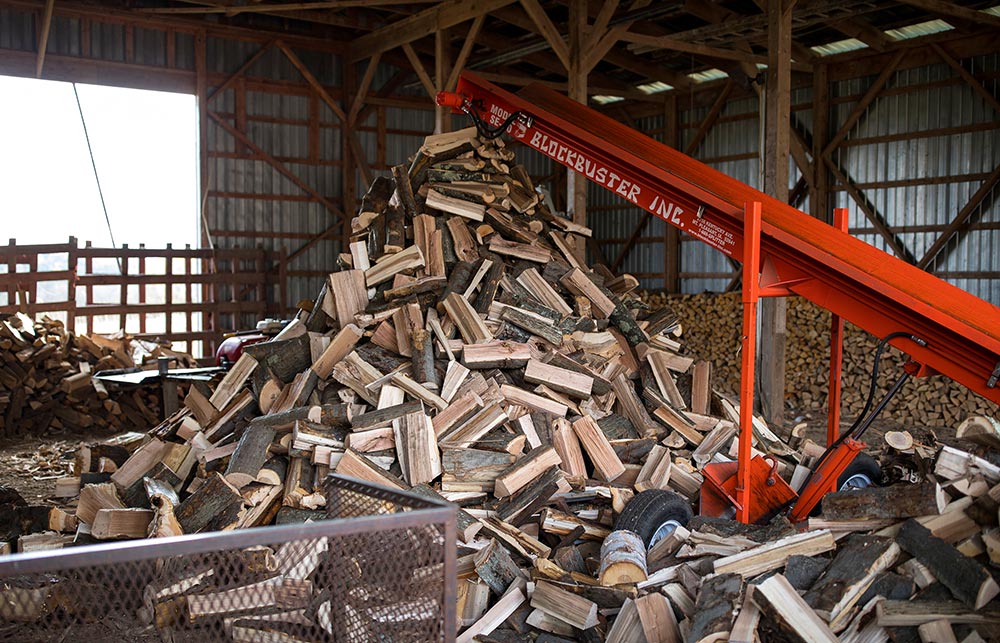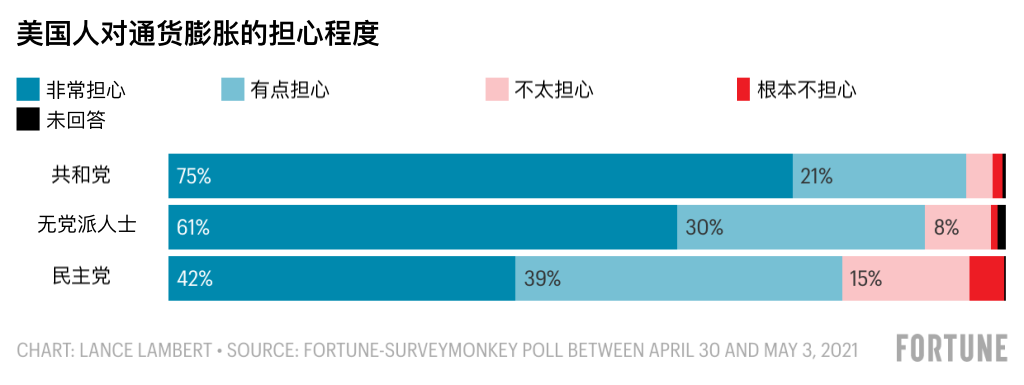 圖片來源:ROBERT NICKELSBERG—GETTY IMAGES
圖片來源:ROBERT NICKELSBERG—GETTY IMAGES上周,當美國財政部部長珍妮特·耶倫表示利率可能會上升時,所有投資者都聽出了“通貨膨脹”和股市下跌的意思。耶倫很快又退了一步說:“我認為不會有通貨膨脹的問題,但如果真的出現,我們還可以寄希望于美聯儲來解決。”
美聯儲的確預見了物價將在2021年以更快的速度上漲,但美聯儲主席杰羅姆·鮑威爾將其稱之為“暫時性”的通脹。隨著經濟全面復蘇,所有商品和服務的價格都將飆升。自新冠疫情開始以來,僅木材一項就已經增長了280%。但是,當市場需求被壓抑后的“報復性回彈”過去,2021年的漲價潮就會慢慢回到正軌。至少美聯儲是這么說的。
那么美國人對潛在的物價上漲有何反應?為了找出答案,《財富》雜志與SurveyMonkey合作,在4月30日至5月3日期間,對2113名美國成年人展開了調查。*該調查的模型化誤差估計為正負3個百分點。
《財富》雜志與SurveyMonkey的調研發現,87%的成年美國人都擔心通貨膨脹,其中58%表示“非常擔心”。這種擔心已經能夠改變消費者的行為了:當人們擔心物價上漲時,他們就會趁價格還穩定在當前水平,盡快消費。這可能會引起對住房或汽車等物品的搶購大戰。
美國人對經濟的看法通常還取決于他們支持的黨派是否當政。下圖是《財富》雜志此前的一張分析圖表,從中就可以看出,在喬·拜登上臺后,共和黨人和民主黨人是如何改變他們的看法的。因此,共和黨人中(75%)表示“非常關注”通脹的人數遠遠超過民主黨(42%)就不足為奇。無黨派人士(61%)則處在中間水平。現在,人們非常擔心物價上漲,而賬面上的通貨膨脹率仍然很低,問題就來了:如果通貨膨脹上升,這會成為一個政治問題嗎?
 美國人對通貨膨脹的擔心程度。資料來源:《財富》與SurveyMonkey于2021年4月30日至5月3日期間進行的調研
美國人對通貨膨脹的擔心程度。資料來源:《財富》與SurveyMonkey于2021年4月30日至5月3日期間進行的調研房價已經開始飆升,成交價的中位數同比增長16%。這從人口統計學上也有跡可循——千禧一代進入了購房高峰階段,加上現在的房貸利率處于歷史低位,大批購房者涌入數量有限的住房市場。根據房屋交易網站realtor.com的數據顯示,待售房屋的數量同比下降了50%以上。
從服務業經濟上看,從夜生活、游樂園到愛彼迎民宿,之前被新冠疫情壓抑的需求也出現驚人的“報復性反彈”。這也為價格急劇上漲奠定了基礎。機票預訂量明顯增加,機票價格也明顯上漲。
但漲幅最大的還是商品:玉米、鋼鐵和銅等。但木材的漲幅幾乎是最高的:根據木材行業資訊網站Random Lengths報道,5月7日,每千板英尺木材的價格飆升至創下歷史新高的1414美元。自疫情爆發以來,木材價格暴漲了295%。這樣的結果是木材的供需關系出現史無前例的失衡導致的——在疫情爆發帶來的種種后果中,這也很符合常理。
美聯儲很可能是對的:住房、商品和服務成本的迅速上漲是“暫時的”。但這一點并不妨礙它可能發展成一個政治問題——只需要回顧一下20世紀70年代和本世紀00年代的兩次“暫時性”的石油危機以及后續的政治后果就能夠知道答案了。(財富中文網)
編譯:陳聰聰
上周,當美國財政部部長珍妮特·耶倫表示利率可能會上升時,所有投資者都聽出了“通貨膨脹”和股市下跌的意思。耶倫很快又退了一步說:“我認為不會有通貨膨脹的問題,但如果真的出現,我們還可以寄希望于美聯儲來解決。”
美聯儲的確預見了物價將在2021年以更快的速度上漲,但美聯儲主席杰羅姆·鮑威爾將其稱之為“暫時性”的通脹。隨著經濟全面復蘇,所有商品和服務的價格都將飆升。自新冠疫情開始以來,僅木材一項就已經增長了280%。但是,當市場需求被壓抑后的“報復性回彈”過去,2021年的漲價潮就會慢慢回到正軌。至少美聯儲是這么說的。
那么美國人對潛在的物價上漲有何反應?為了找出答案,《財富》雜志與SurveyMonkey合作,在4月30日至5月3日期間,對2113名美國成年人展開了調查。*該調查的模型化誤差估計為正負3個百分點。
《財富》雜志與SurveyMonkey的調研發現,87%的成年美國人都擔心通貨膨脹,其中58%表示“非常擔心”。這種擔心已經能夠改變消費者的行為了:當人們擔心物價上漲時,他們就會趁價格還穩定在當前水平,盡快消費。這可能會引起對住房或汽車等物品的搶購大戰。
美國人對經濟的看法通常還取決于他們支持的黨派是否當政。下圖是《財富》雜志此前的一張分析圖表,從中就可以看出,在喬·拜登上臺后,共和黨人和民主黨人是如何改變他們的看法的。因此,共和黨人中(75%)表示“非常關注”通脹的人數遠遠超過民主黨(42%)就不足為奇。無黨派人士(61%)則處在中間水平。現在,人們非常擔心物價上漲,而賬面上的通貨膨脹率仍然很低,問題就來了:如果通貨膨脹上升,這會成為一個政治問題嗎?
房價已經開始飆升,成交價的中位數同比增長16%。這從人口統計學上也有跡可循——千禧一代進入了購房高峰階段,加上現在的房貸利率處于歷史低位,大批購房者涌入數量有限的住房市場。根據房屋交易網站realtor.com的數據顯示,待售房屋的數量同比下降了50%以上。
從服務業經濟上看,從夜生活、游樂園到愛彼迎民宿,之前被新冠疫情壓抑的需求也出現驚人的“報復性反彈”。這也為價格急劇上漲奠定了基礎。機票預訂量明顯增加,機票價格也明顯上漲。
但漲幅最大的還是商品:玉米、鋼鐵和銅等。但木材的漲幅幾乎是最高的:根據木材行業資訊網站Random Lengths報道,5月7日,每千板英尺木材的價格飆升至創下歷史新高的1414美元。自疫情爆發以來,木材價格暴漲了295%。這樣的結果是木材的供需關系出現史無前例的失衡導致的——在疫情爆發帶來的種種后果中,這也很符合常理。
美聯儲很可能是對的:住房、商品和服務成本的迅速上漲是“暫時的”。但這一點并不妨礙它可能發展成一個政治問題——只需要回顧一下20世紀70年代和本世紀00年代的兩次“暫時性”的石油危機以及后續的政治后果就能夠知道答案了。(財富中文網)
編譯:陳聰聰
When Treasury Secretary Janet Yellen said last week that interest rates could rise, all investors heard was the I-word and stocks dropped. Yellen quickly walked back that statement: "I don’t think there’s going to be an inflationary problem, but if there is, the Fed can be counted on to address it."
The Federal Reserve does see prices rising at a faster pace in 2021, but Chair Jerome Powell calls it "transitory" inflation. As the economy hits full gear, prices for everything from commodities to services will spike. Lumber alone is already up 280% since the onset of the pandemic. But once the burst from pent-up demand passes, 2021 price hikes should correct. At least that's the Fed's narrative.
So how are Americans reacting to the potential for price hikes? To find out, Fortune teamed up with SurveyMonkey to poll 2,113 adults in the U.S. between April 30 and May 3.* The poll's modeled error estimate is plus or minus 3 percentage points.
The Fortune-SurveyMonkey poll finds 87% of U.S. adults are concerned about inflation, including 58% who say they are "very concerned." That can already cause a change in consumer behavior: When people are afraid of prices rising, they spend money faster in order to lock in a price. This could result in bidding wars on things such as homes or cars.
Americans' view of the economy often depends on whether their party occupies the White House. Just look at this past Fortune Analytics chart and see how Republicans and Democrats flipped views after Biden took office. So it isn't surprising that the share of Republicans (75%) who are "very concerned" about inflation is much higher than Democrats (42%). And Independents (61%) are right in the middle. Given how high those concern levels are now—with inflation still pretty low on paper—it poses the question: If inflation takes off, will it become a political issue?
Already, prices are soaring in the housing market, with the median sales price up 16% year over year. That's the result of demographics—millennials hitting their peak home-buying years—and historically low mortgage rates combining to create an influx of buyers who bid up a limited number of homes. The number of homes for sales is down over 50% year over year, according to realtor.com.
There's also an incredible amount of pent-up demand in the service side of the economy, for everything from nightlife to amusement parks to Airbnb rentals. That's also setting the stage for steep price hikes. We're already seeing a huge rise in booked flights—and upped flight prices.
But the biggest price hikes are in commodities: corn, steel, and copper, for instance. But none more so than lumber: On May 7, the price per thousand board feet of lumber soared to an all-time high of $1,414, according to Random Lengths. Since the onset of the pandemic, the price of lumber has skyrocketed 295%. This is the result of an unprecedented mismatch in lumber supply and demand—something set off by pandemic-spurred trends in TK.
The Fed very well could be right: The rapid rise in housing, commodities, and services costs is "transitory." But that alone won't prevent it from becoming a political issue. Just look back at the temporary oil shocks in the 1970s and 2000s—and the subsequent political backlash.






